Intergovernmental Committee for Refugees
While representatives of all the states at the conference express sympathy with the refugees, none agree to accept more of them. The final resolution also confirms that no state must make financial resources available or alter its “framework of existing migration laws and practices.”
Since the refugee problem can only be resolved through a long-term and comprehensive aid program, both for refugees who have already fled and for future “involuntary emigrants” from Germany and Austria, the resolution announces that the conference will become a permanent institution, the Intergovernmental Committee for Refugees.
Unlike the commissioner for refugees of the League of Nations, from which the German Reich withdrew in 1933 and whose institutions it has since boycotted, the Intergovernmental Committee can negotiate with the Reich government about allowing Jews to take some of their assets with them in order to ease their emigration. In addition, the committee investigates the viability of undeveloped areas in British Guiana, the Dominican Republic and French New Caledonia for the settlement of Jewish refugees.
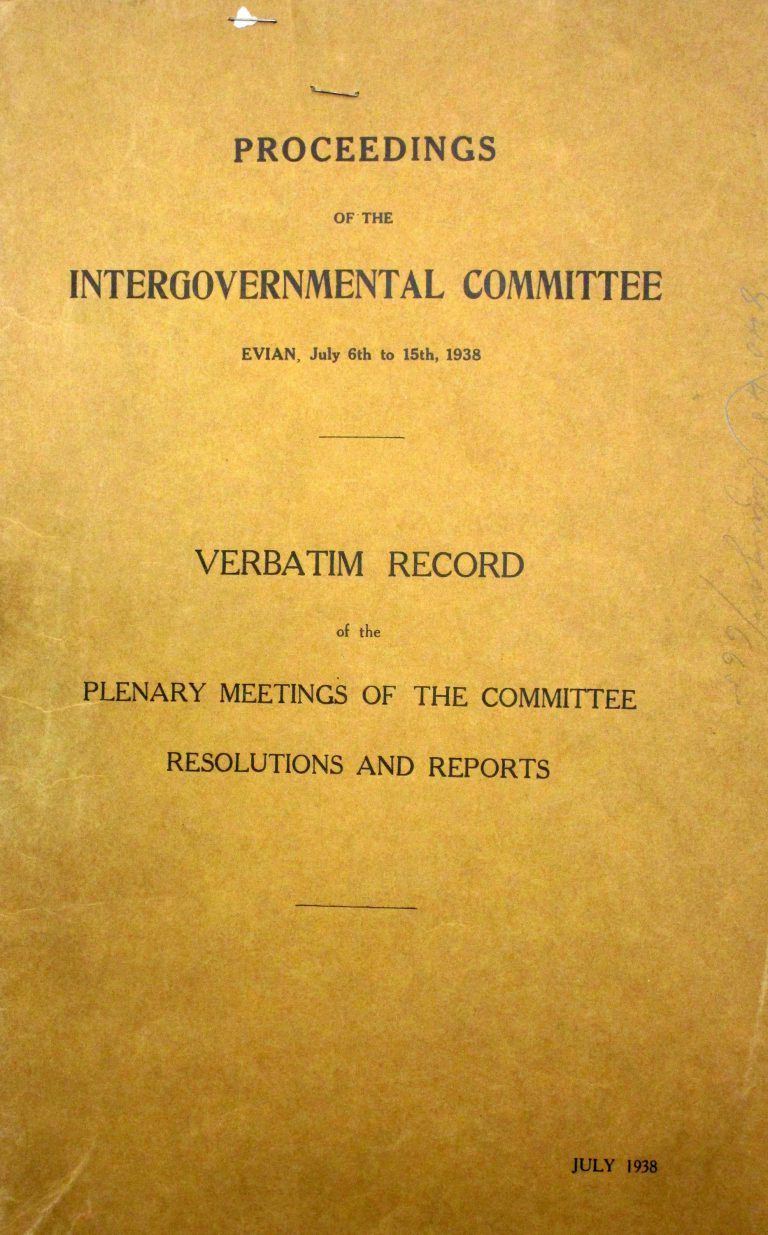
“Proceedings of the Intergovernmental Committee,” p. 1/3
Under this title the minutes of the public meetings and the conference‘s resolutions are published in English and French. The final resolution combines a review of the conference with recommendations for the committee’s future work, expressing understanding for the reluctance of participating states to admit refugees as well as stressing the urgency of finding an international solution for the humanitarian crisis.
Franklin D. Roosevelt Library, Hyde Park, NY
“Proceedings of the Intergovernmental Committee,” p. 1/3
Under this title the minutes of the public meetings and the conference‘s resolutions are published in English and French. The final resolution combines a review of the conference with recommendations for the committee’s future work, expressing understanding for the reluctance of participating states to admit refugees as well as stressing the urgency of finding an international solution for the humanitarian crisis.
Franklin D. Roosevelt Library, Hyde Park, NY
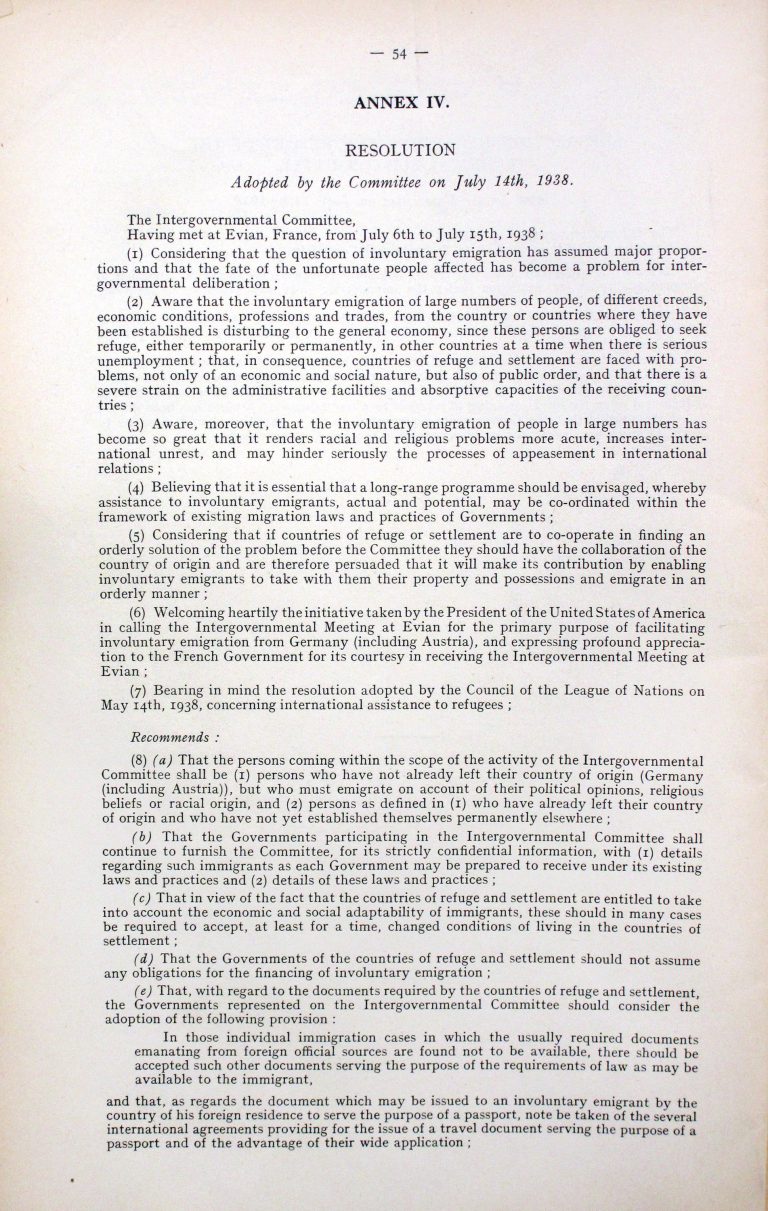
“Proceedings of the Intergovernmental Committee,” p. 2/3
Under this title the minutes of the public meetings and the conference‘s resolutions are published in English and French. The final resolution combines a review of the conference with recommendations for the committee’s future work, expressing understanding for the reluctance of participating states to admit refugees as well as stressing the urgency of finding an international solution for the humanitarian crisis.
Franklin D. Roosevelt Library, Hyde Park, NY
“Proceedings of the Intergovernmental Committee,” p. 2/3
Under this title the minutes of the public meetings and the conference‘s resolutions are published in English and French. The final resolution combines a review of the conference with recommendations for the committee’s future work, expressing understanding for the reluctance of participating states to admit refugees as well as stressing the urgency of finding an international solution for the humanitarian crisis.
Franklin D. Roosevelt Library, Hyde Park, NY
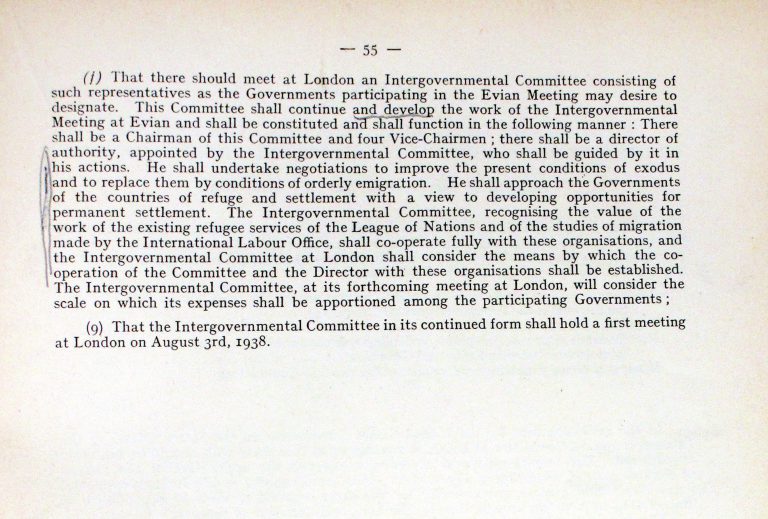
“Proceedings of the Intergovernmental Committee,” p. 3/3
Under this title the minutes of the public meetings and the conference‘s resolutions are published in English and French. The final resolution combines a review of the conference with recommendations for the committee’s future work, expressing understanding for the reluctance of participating states to admit refugees as well as stressing the urgency of finding an international solution for the humanitarian crisis.
Franklin D. Roosevelt Library, Hyde Park, NY
“Proceedings of the Intergovernmental Committee,” p. 3/3
Under this title the minutes of the public meetings and the conference‘s resolutions are published in English and French. The final resolution combines a review of the conference with recommendations for the committee’s future work, expressing understanding for the reluctance of participating states to admit refugees as well as stressing the urgency of finding an international solution for the humanitarian crisis.
Franklin D. Roosevelt Library, Hyde Park, NY
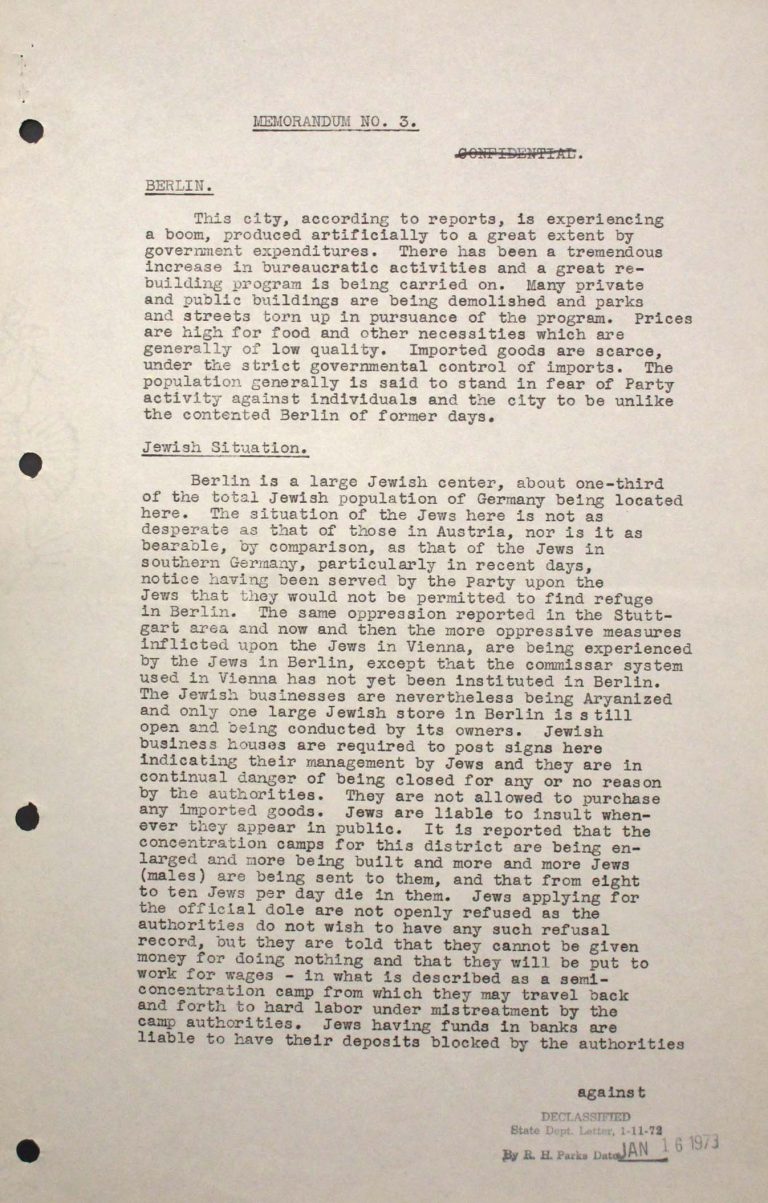
George L. Brandt, Memorandum No. 3 (Berlin), July 30, 1938, p. 1/3
Shortly after the conference in Évian, George L. Brandt, advisor to the US delegation, is sent to Stuttgart, Vienna and Berlin to look into the current situation of the Jewish populations there. He summarizes his findings in memoranda of several pages in length; these notes are submitted to the Intergovernmental Committee at its first meeting in London on August 3, 1938.
Franklin D. Roosevelt Library, Hyde Park, NY
George L. Brandt, Memorandum No. 3 (Berlin), July 30, 1938, p. 1/3
Shortly after the conference in Évian, George L. Brandt, advisor to the US delegation, is sent to Stuttgart, Vienna and Berlin to look into the current situation of the Jewish populations there. He summarizes his findings in memoranda of several pages in length; these notes are submitted to the Intergovernmental Committee at its first meeting in London on August 3, 1938.
Franklin D. Roosevelt Library, Hyde Park, NY
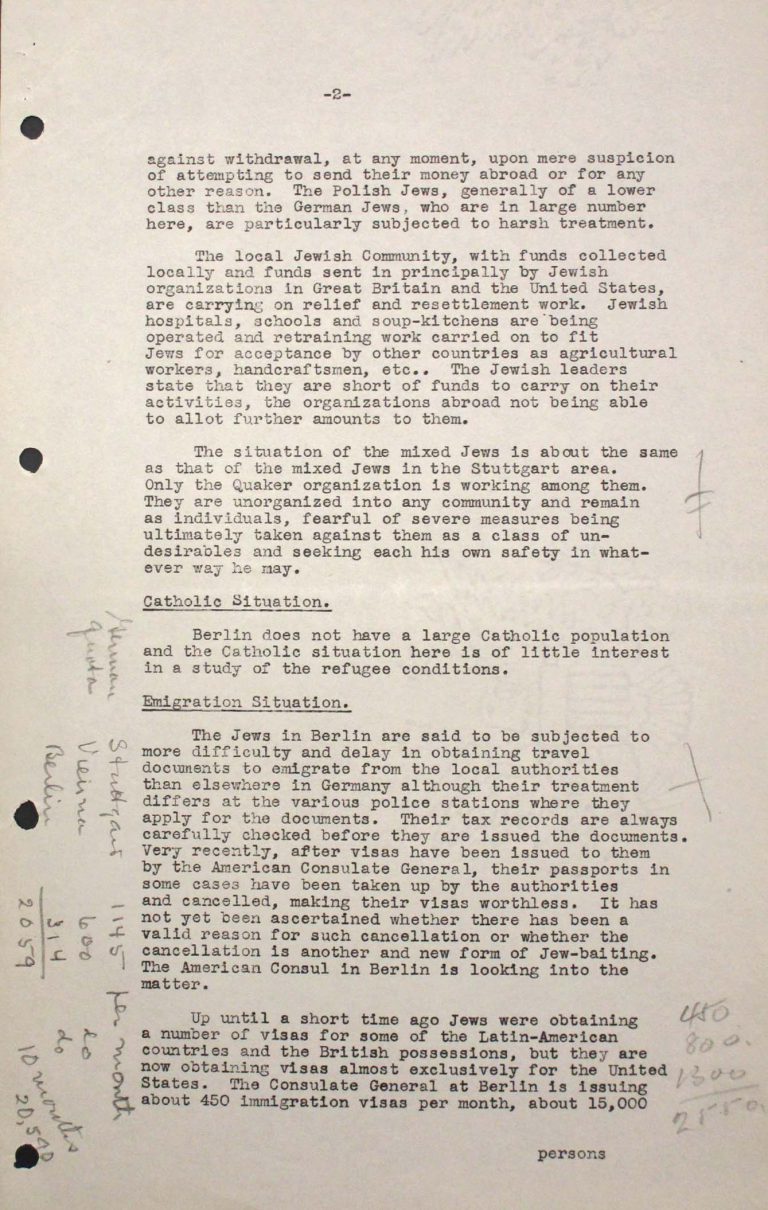
George L. Brandt, Memorandum No. 3 (Berlin), July 30, 1938, p. 2/3
Shortly after the conference in Évian, George L. Brandt, advisor to the US delegation, is sent to Stuttgart, Vienna and Berlin to look into the current situation of the Jewish populations there. He summarizes his findings in memoranda of several pages in length; these notes are submitted to the Intergovernmental Committee at its first meeting in London on August 3, 1938.
Franklin D. Roosevelt Library, Hyde Park, NY
George L. Brandt, Memorandum No. 3 (Berlin), July 30, 1938, p. 2/3
Shortly after the conference in Évian, George L. Brandt, advisor to the US delegation, is sent to Stuttgart, Vienna and Berlin to look into the current situation of the Jewish populations there. He summarizes his findings in memoranda of several pages in length; these notes are submitted to the Intergovernmental Committee at its first meeting in London on August 3, 1938.
Franklin D. Roosevelt Library, Hyde Park, NY
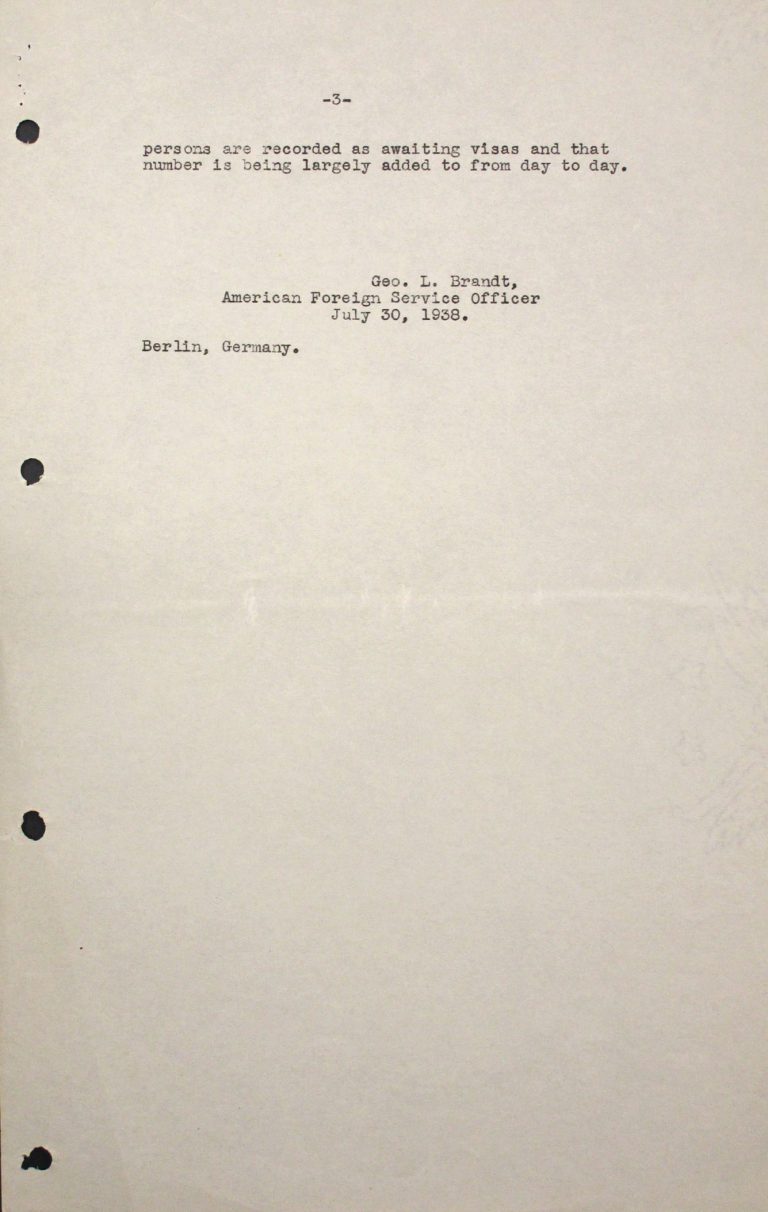
George L. Brandt, Memorandum No. 3 (Berlin), July 30, 1938, p. 3/3
Shortly after the conference in Évian, George L. Brandt, advisor to the US delegation, is sent to Stuttgart, Vienna and Berlin to look into the current situation of the Jewish populations there. He summarizes his findings in memoranda of several pages in length; these notes are submitted to the Intergovernmental Committee at its first meeting in London on August 3, 1938.
Franklin D. Roosevelt Library, Hyde Park, NY
George L. Brandt, Memorandum No. 3 (Berlin), July 30, 1938, p. 3/3
Shortly after the conference in Évian, George L. Brandt, advisor to the US delegation, is sent to Stuttgart, Vienna and Berlin to look into the current situation of the Jewish populations there. He summarizes his findings in memoranda of several pages in length; these notes are submitted to the Intergovernmental Committee at its first meeting in London on August 3, 1938.
Franklin D. Roosevelt Library, Hyde Park, NY
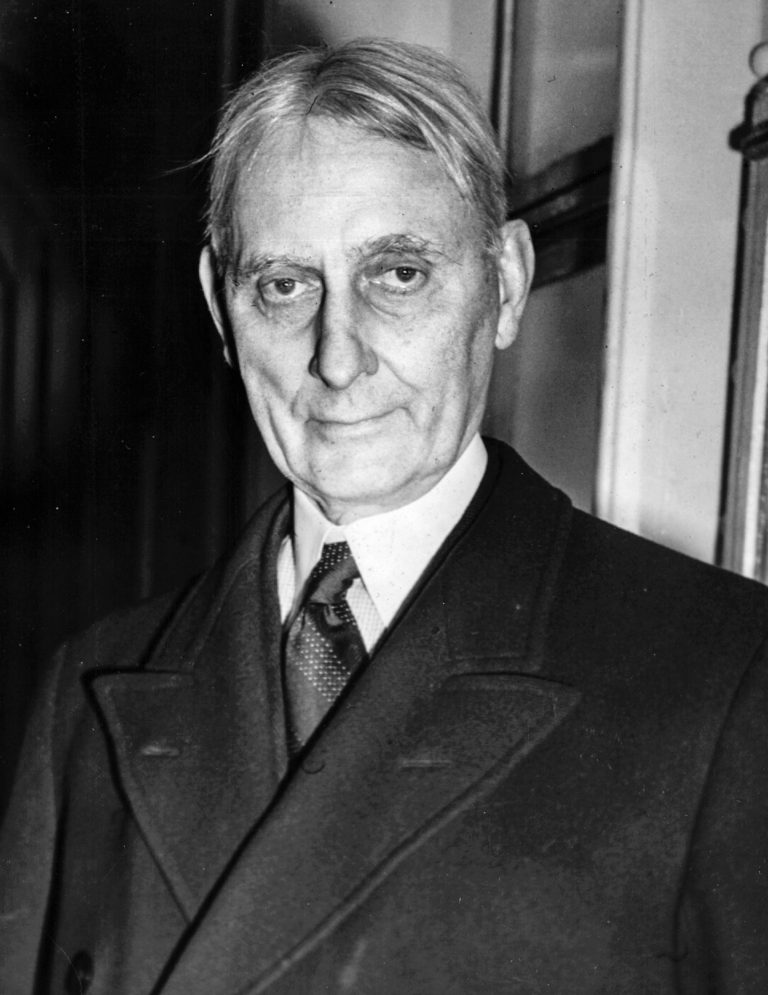
George Rublee, 1939
The Intergovernmental Committee is headed by George Rublee, age 70, a well-known Washington attorney with experience in negotiating international agreements.
Bettmann Archive / Getty Images
George Rublee, 1939
The Intergovernmental Committee is headed by George Rublee, age 70, a well-known Washington attorney with experience in negotiating international agreements.
Bettmann Archive / Getty Images
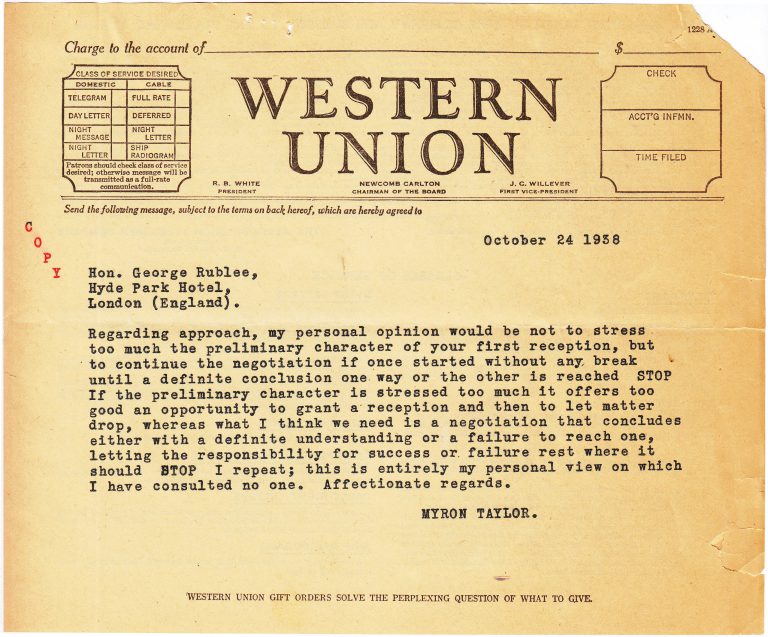
Myron C. Taylor to George Rublee, October 24, 1938
George Rublee and Myron C. Taylor determine the strategy for reaching an agreement with the German government over releasing at least a small proportion of the assets of the emigrating Jews so as to make their immigration more attractive to potential host countries.
National Archives, College Park, MD
Myron C. Taylor to George Rublee, October 24, 1938
George Rublee and Myron C. Taylor determine the strategy for reaching an agreement with the German government over releasing at least a small proportion of the assets of the emigrating Jews so as to make their immigration more attractive to potential host countries.
National Archives, College Park, MD
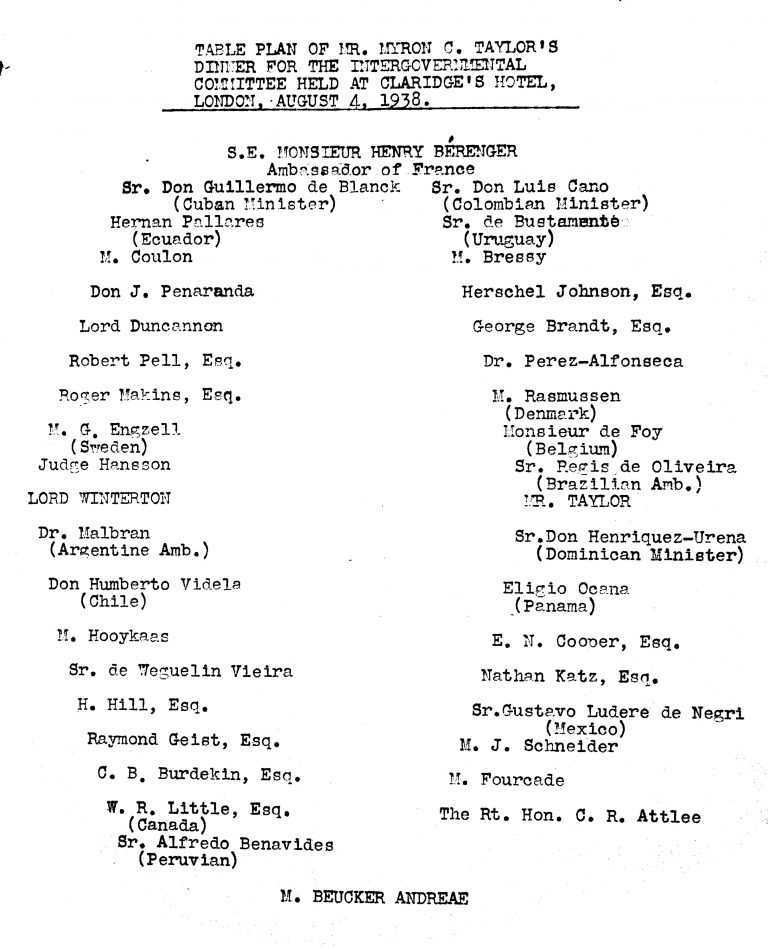
Seating arrangement for Myron C. Taylor’s reception at the committee’s first meeting, August 3-4, 1938, in London
Member states send their Évian Conference delegates or other diplomats – or a combination of the two – to the Intergovernmental Committee meeting. Some states that participated in the conference do not join the committee or withdraw after a brief membership.
Franklin D. Roosevelt Library, Hyde Park, NY
Seating arrangement for Myron C. Taylor’s reception at the committee’s first meeting, August 3-4, 1938, in London
Member states send their Évian Conference delegates or other diplomats – or a combination of the two – to the Intergovernmental Committee meeting. Some states that participated in the conference do not join the committee or withdraw after a brief membership.
Franklin D. Roosevelt Library, Hyde Park, NY
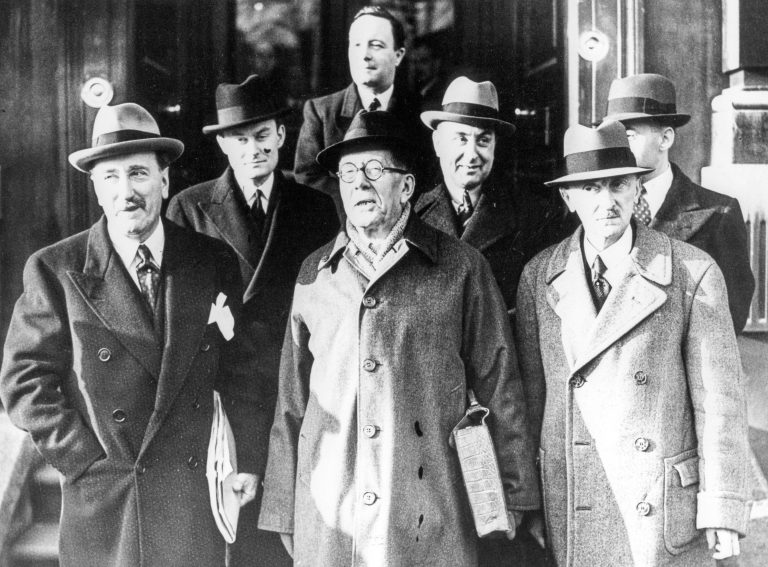
The French delegation at the committee’s meeting, London, December 2, 1938
Front row, l.-r.: Georges Coulon, Henry Bérenger, René Thierry (official of the French Foreign Ministry). François Seydoux de Clausonne is in the back row, center.
SZ Photo, München
The French delegation at the committee’s meeting, London, December 2, 1938
Front row, l.-r.: Georges Coulon, Henry Bérenger, René Thierry (official of the French Foreign Ministry). François Seydoux de Clausonne is in the back row, center.
SZ Photo, München
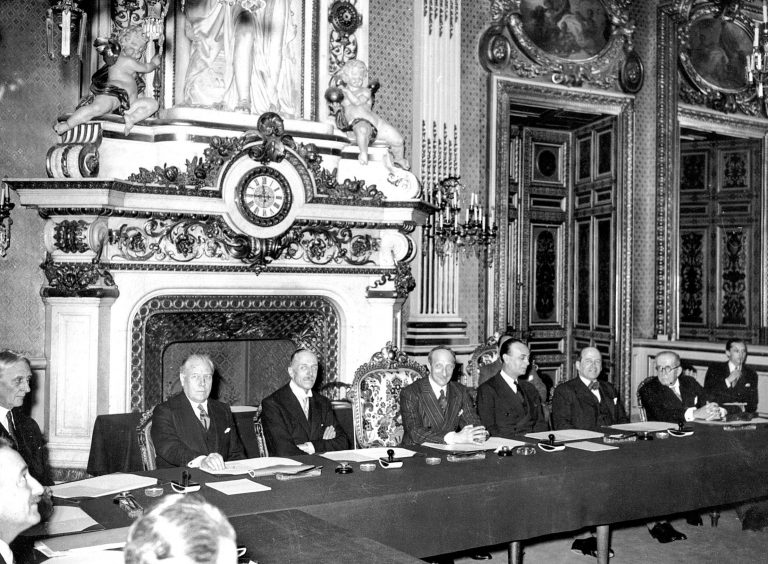
Meeting of t he Intergovernmental Committee (from left to right: Rublee, Taylor, Winterton, Bonnet, Cárcano, Lobo, Bérenger) at the French Foreign Ministry, Paris, February 15, 1939
The final resolution stipulates the establishment of a board of directors to assist the Committee director. Lord Winterton takes the position of chair, with Myron C. Taylor (US), Henry Bérenger (France), Willem Cornelis Beucker Andreae (Netherlands) and Hélio Lobo (Brazil) as his deputies. Hélio Lobos appointment as Latin American representative is particularly important to the US. At Rublee’s request, Robert T. Pell, an experienced US diplomat, is named managing director.
SZ Photo, München
Meeting of t he Intergovernmental Committee (from left to right: Rublee, Taylor, Winterton, Bonnet, Cárcano, Lobo, Bérenger) at the French Foreign Ministry, Paris, February 15, 1939
The final resolution stipulates the establishment of a board of directors to assist the Committee director. Lord Winterton takes the position of chair, with Myron C. Taylor (US), Henry Bérenger (France), Willem Cornelis Beucker Andreae (Netherlands) and Hélio Lobo (Brazil) as his deputies. Hélio Lobos appointment as Latin American representative is particularly important to the US. At Rublee’s request, Robert T. Pell, an experienced US diplomat, is named managing director.
SZ Photo, München










